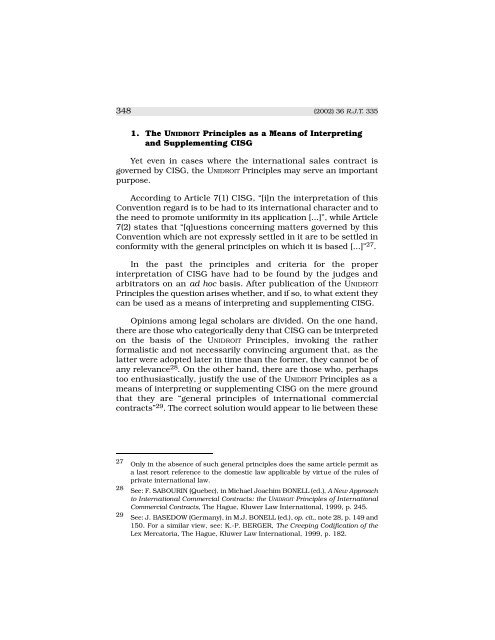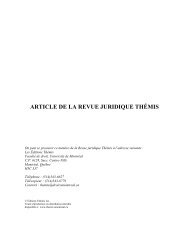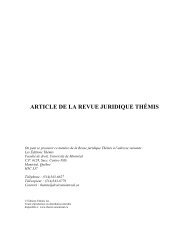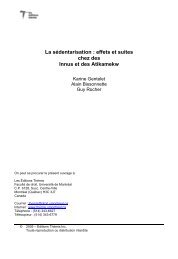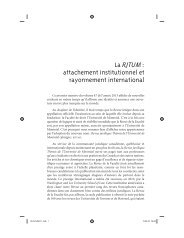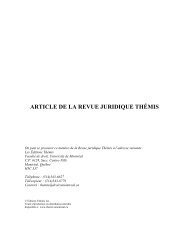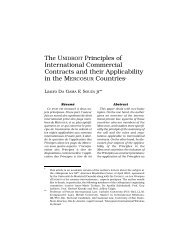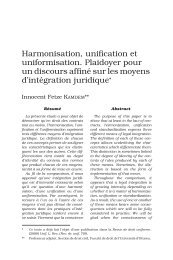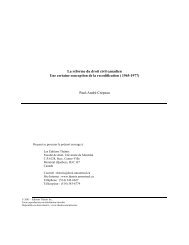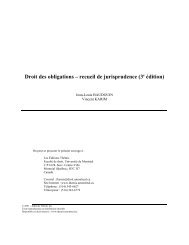The UNIDROIT Principles of International Commercial Contracts and ...
The UNIDROIT Principles of International Commercial Contracts and ...
The UNIDROIT Principles of International Commercial Contracts and ...
You also want an ePaper? Increase the reach of your titles
YUMPU automatically turns print PDFs into web optimized ePapers that Google loves.
348 (2002) 36 R.J.T. 335<br />
1. <strong>The</strong> <strong>UNIDROIT</strong> <strong>Principles</strong> as a Means <strong>of</strong> Interpreting<br />
<strong>and</strong> Supplementing CISG<br />
Yet even in cases where the international sales contract is<br />
governed by CISG, the <strong>UNIDROIT</strong> <strong>Principles</strong> may serve an important<br />
purpose.<br />
A c c o rding to Article 7(1) CISG, “[i]n the interpretation <strong>of</strong> this<br />
Convention regard is to be had to its international character <strong>and</strong> to<br />
the need to promote uniformity in its application [...]”, while Article<br />
7(2) states that “[q]uestions concerning matters governed by this<br />
Convention which are not expressly settled in it are to be settled in<br />
conformity with the general principles on which it is based [...]” 27 .<br />
In the past the principles <strong>and</strong> criteria for the pro p e r<br />
i n t e r p retation <strong>of</strong> CISG have had to be found by the judges <strong>and</strong><br />
arbitrators on an ad hoc basis. After publication <strong>of</strong> the UN I D R O I T<br />
<strong>Principles</strong> the question arises whether, <strong>and</strong> if so, to what extent they<br />
can be used as a means <strong>of</strong> interpreting <strong>and</strong> supplementing CISG.<br />
Opinions among legal scholars are divided. On the one h<strong>and</strong>,<br />
t h e re are those who categorically deny that CISG can be interpre t e d<br />
on the basis <strong>of</strong> the UN I D R O I T <strong>Principles</strong>, invoking the rather<br />
f o rmalistic <strong>and</strong> not necessarily convincing argument that, as the<br />
latter were adopted later in time than the former, they cannot be <strong>of</strong><br />
any relevance 28 . On the other h<strong>and</strong>, there are those who, perhaps<br />
too enthusiastically, justify the use <strong>of</strong> the <strong>UNIDROIT</strong> <strong>Principles</strong> as a<br />
means <strong>of</strong> interpreting or supplementing CISG on the mere ground<br />
that they are “general principles <strong>of</strong> international commerc i a l<br />
c o n t r a c t s ” 29 . <strong>The</strong> correct solution would appear to lie between these<br />
27 Only in the absence <strong>of</strong> such general principles does the same article permit as<br />
a last resort re f e rence to the domestic law applicable by virtue <strong>of</strong> the rules <strong>of</strong><br />
private international law.<br />
28 See: F. SABOURIN (Quebec), in Michael Joachim BONELL (ed.), A New Appro a c h<br />
to <strong>International</strong> <strong>Commercial</strong> <strong>Contracts</strong>: the UN I D R O I T <strong>Principles</strong> <strong>of</strong> Intern a t i o n a l<br />
<strong>Commercial</strong> <strong>Contracts</strong>, <strong>The</strong> Hague, Kluwer Law <strong>International</strong>, 1999, p. 245.<br />
29 See: J. BASEDOW (Germany), in M.J. BONELL (ed.), op. cit., note 28, p. 149 <strong>and</strong><br />
150. For a similar view, see: K.-P. BERGER, <strong>The</strong> Creeping Codification <strong>of</strong> the<br />
Lex Mercatoria, <strong>The</strong> Hague, Kluwer Law <strong>International</strong>, 1999, p. 182.


